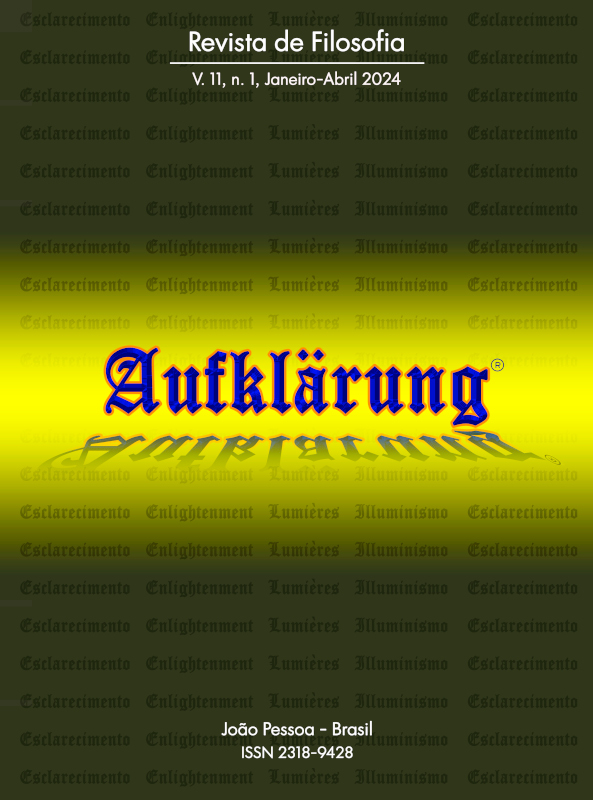Artificiality and insufficiency of Kant's classification regarding theistics arguments
DOI:
https://doi.org/10.18012/arf.v11i1.67634Keywords:
ontological argument, cosmological argument, physical-theological argument, KantAbstract
In the Transcendental Dialectic of the Critique of Pure Reason (1787), Kant argues for the impossibility of theistic arguments, namely the ontological, cosmological, and physico-theological arguments. However, his objection relies on his classification of theistic arguments, which has been criticized by analytical philosophers of religion such as Plantinga (2012) and Swinburne (2019). Therefore, this paper aims to critically investigate two problems related to this classification: the systematic criteria of its classification and the historical sufficiency of its three theistic proofs. Regarding the first problem, it will be argued that it is possible to recognize a certain systematic artificiality in Kant's classification of theistic proofs, given the criticisms of Strawson (1966) and Hegel (1812, 1830), as well as the internal critique developed by the authors of this work. Regarding the second problem, it will be argued that it is possible to indicate a certain historical insufficiency in Kant's classification of the three theistic proofs, based on brief critiques focused on some classical theologians such as Anselm, Aquinas, and Al-Ghazali. Finally, once it is justified that Kant's objection depends on this possibly artificial and insufficient classification, it will be briefly indicated that Kant does not seem as justified as he intended in his objection to theistic arguments.
Downloads
References
ANSELMO. Monológio; Proslógio. Trad. Angelo Ricci. 2º Edição. São Paulo: Abril Cultural, 1979. (Coleção Os Pensadores).
AQUINO, Tomás de. Suma Teológica, Vol. 1. Trad. Alexandre Correia. Campinas: Ecclesiae, 2018.
CIRNE LIMA, Carlos R. A lógica do absoluto. Síntese. V. 20, n. 63, p. 499-532, 1993. Disponível em: https://www.faje.edu.br/periodicos/index.php/Sintese/article/view/1296. Acesso em: 04 abr. 2023.
CRAIG, William Lane. The Kalam Cosmological Argument. London: MacMillan, 1979.
CUNHA, Bruno. Estudo introdutório. In: KANT, Immanuel. Lições sobre a doutrina filosófica da religião. Trad. Bruno Cunha. Petrópolis, RJ: Vozes; Bragança Paulista, SP: Editora Universitária São Francisco, 2019. (Coleção Pensamento Humano).
FAGGION, Andrea L.B. Refutação do Argumento Ontológico, ou Filosofia Crítica Versus Filosofia Dogmática. Veritas, Porto Alegre, v. 56, n. 2, p. 64-83, 2011. Disponível em: https://revistaseletronicas.pucrs.br/ojs/index.php/veritas/article/view/8282. Acesso em 19 jan. 2023.
FICHTE, Johann G. A doutrina da ciência de 1794. São Paulo: Nova Cultural, 1988.
HEGEL, Wilhelm F. Ciência da lógica: 1- A doutrina do ser. Petrópolis: E. Vozes; Bragança Paulista: Ed. Universitária S. Francisco, 2016.
HEGEL, Wilhelm F. Enciclopédia das ciências filosóficas: I- A ciência da lógica (1830). São Paulo: Ed. Loyola, 1995.
HEMPEL, Carl G. Philosophy of Natural Science. Princeton: Prentice-Hall, 1966.
HÖSLE, Vittorio. O Sistema de Hegel: o idealismo da subjetividade e o problema da intersubjetividade. São Paulo: Ed. Loyola, 2007.
KANT, Immanuel. Crítica da razão pura. Trad. Valério Rohden e Udo Baldur Moosburger. 2º Edição. São Paulo: Abril Cultural, 1983. (Coleção Os Pensadores).
KANT, Immanuel. Crítica da razão prática. 4º Edição. Trad. Valério Rohden. São Paulo: Editora WMF Martins Fontes, 2016.
KANT, Immanuel. Lições sobre a doutrina filosófica da religião. Trad. Bruno Cunha. Petrópolis, RJ: Vozes; Bragança Paulista, SP: Editora Universitária São Francisco, 2019. (Coleção Pensamento Humano).
KANT, Immanuel. Prolegômenos a toda metafísica futura. Trad. Artur Morão. Lisboa: Edições 70, 1988.
KANT, Immanuel. Prolegômenos a qualquer metafísica futura. Trad. José Oscar de Almeida Marques. São Paulo: Estação Liberdade, 2014.
LOPARIC, Zeljko. A semântica transcendental de Kant. 3º Edição. Campinas: Unicamp, Centro de Lógica, Epistemologia e História da Ciência, 2005.
MALCOLM, Norman. Anselm's Ontological Arguments. Philosophical Review, Durham, v. 69, n. 1, p. 41-62, 1960.
MANDELI, Alison Vander. Comentários sobre a crítica de Kant ao argumento ontológico. In: TOLLETO, Milene Consenso; PINZANI, Alessandro (orgs). Investigações kantianas II: novas vozes. Florianópolis: NEFIPO, 2013. (Nefiponline).
MORTARI, Cezar A. Introdução à Lógica. 2º Edição. São Paulo: Editora Unesp, 2016.
NICOLAU, Marcos F. A. A ciência da lógica no sistema hegeliano. Kínesis, Vol. II, n° 03, p. 144 – 156, Abril-2010. Disponível em: https://revistas.marilia.unesp.br/index.php/ kinesis/article/view/4342. Acesso em: 04 abr. 2023.
PLANTINGA, Alvin. Deus, a liberdade e o mal. Trad. Desidério Murcho. São Paulo: Vida Nova, 2012.
PLANTINGA, Alvin. The Nature of Necessity. New York: Oxford University Press, 1974.
PLANT, Raymond. Hegel: Sobre religião e filosofia. Trad: Oswaldo Giacóia. São*Paulo: Unesp, 2000.
PORTUGAL, Agnaldo Cuoco. Fé, razão e salto no escuro: uma comparação entre Alvin Plantinga e Richard Swinburne. Veritas, Porto Alegre, v. 56, n. 2, 2011, p. 18-31. Disponível em: https://revistaseletronicas.pucrs.br/ojs/index.php/veritas/article/view/9935. Acesso em 19 jan. 2023.
STRAWSON, P. F. The Bounds of Sense: an essay on Kant’s Critique of Pure Reason. New York: Routledge, 1966.
SWINBURNE, Richard. A existência de Deus. Trad. Agnaldo Cuoco Portugal. 2º Edição. Brasília, DF: Academia Monergista, 2019.
WOOD, Allen. Kant’s Rational Theology. New York: Cornell University Press, 1978.
Additional Files
Published
How to Cite
Issue
Section
License

This work is licensed under a Creative Commons Attribution 4.0 International License.
Journal general policy
1.This journal works under a Creative Commons License aplied to online journals. That icence can be read in the following link: Creative Commons Attribution 4.0 International (CC BY 4.0).
2.Accordingly to this License, a)the journal declares that authors hold the copyright of their articles without restrictions, and they can archieve them as post-print elsewhere. b)the journal allow the author(s) to retain publishing rights without restrictions.
Metadata Policy for information describing items in the repository
1. Anyone may access the metadata free of charge at anytime.
2.The metadata may be re-used in any medium without prior permission, even commercial purposes provided the OAI Identifier or a link to the original metadata record are given, under the terms of a CC BY license refered for the Journal.







































